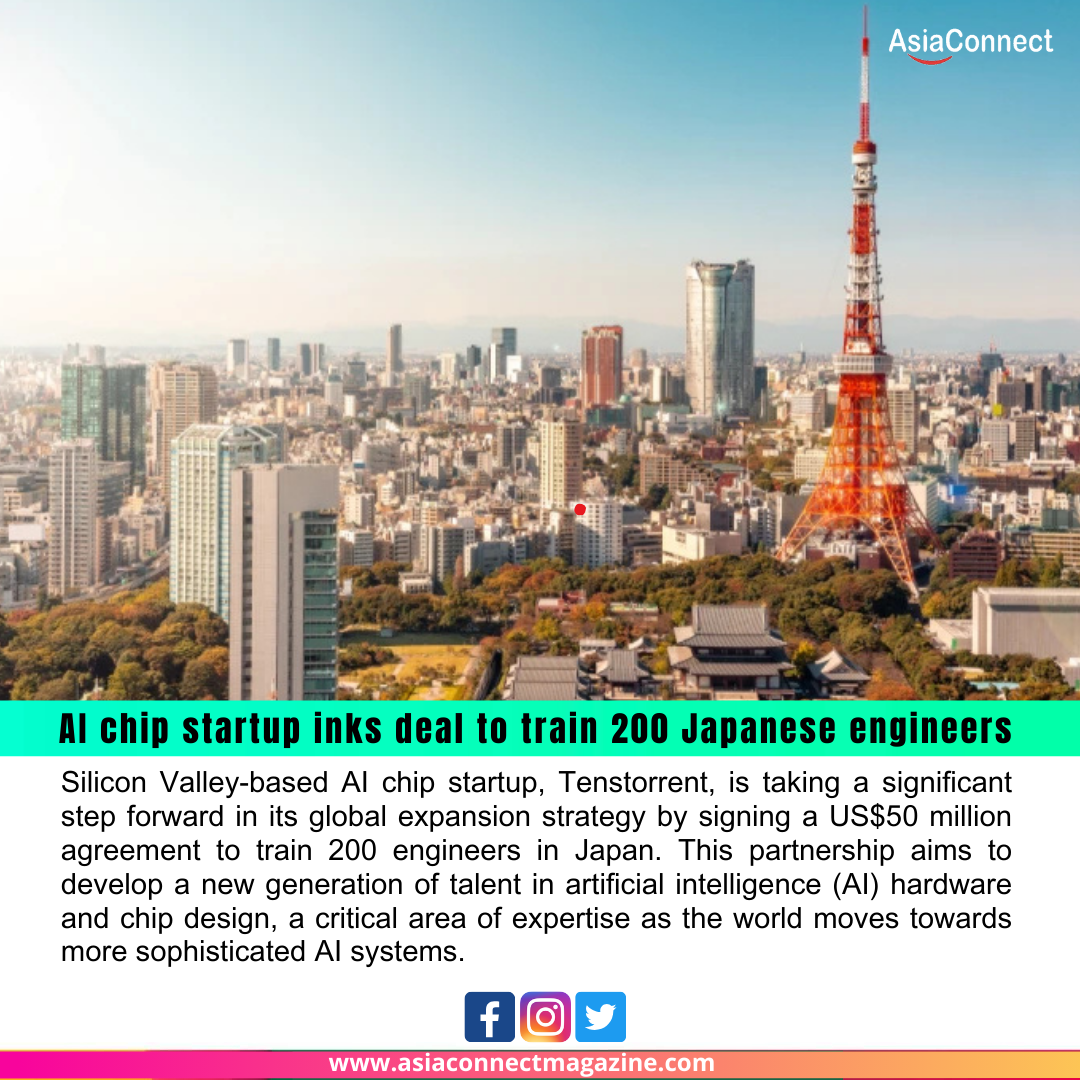Silicon Valley-based AI chip startup, Tenstorrent, is taking a significant step forward in its global expansion strategy by signing a US$50 million agreement to train 200 engineers in Japan. This partnership aims to develop a new generation of talent in artificial intelligence (AI) hardware and chip design, a critical area of expertise as the world moves towards more sophisticated AI systems.
The Deal and Its Implications
Under the terms of the agreement, Tenstorrent will collaborate with Japanese educational institutions and technology companies to provide specialized training to engineers focused on the next wave of AI hardware development. The deal includes not only funding but also access to Tenstorrent’s advanced training programs and proprietary technologies. This investment underscores the startup’s growing ambition to establish a strong presence in the Japanese market and support Japan’s expanding AI ecosystem.
The training will focus on core AI chip design and related fields, such as machine learning accelerators, data processing units, and specialized hardware for deep learning applications. Tenstorrent plans to work closely with local academic and industrial partners to ensure the program is tailored to the needs of the Japanese market. By cultivating a skilled workforce, Tenstorrent is positioning itself as a key player in the development of cutting-edge AI chips that will power future advancements in industries like robotics, autonomous vehicles, and AI-driven enterprise solutions.
Why Japan?
Japan has long been a global leader in technology and innovation, particularly in areas such as robotics, consumer electronics, and automotive systems. However, the country has been somewhat behind in the race to develop AI chips and other advanced hardware, an area dominated by companies based in the U.S. and China. With this new deal, Tenstorrent seeks to help Japan strengthen its capabilities in AI chip development and close the gap with other global leaders.
The Japanese government has been actively working to bolster the country’s AI and semiconductor industries, with several initiatives aimed at promoting research and development in these fields. By training a new generation of engineers, Tenstorrent is aligning itself with Japan’s long-term technological goals. The move also helps Tenstorrent tap into the growing demand for AI hardware expertise in the region, which is set to accelerate as AI adoption becomes more widespread across various industries in Japan.
Tenstorrent’s Global Ambitions
Founded by AI industry veteran Jim Keller, Tenstorrent has already made waves in the AI chip market with its high-performance processors designed for modern machine learning and deep learning applications. Known for its work on highly scalable, energy-efficient chips, the company is positioning itself to compete with giants like NVIDIA, AMD, and Intel in the rapidly expanding AI hardware market. The partnership with Japan is just one of many steps the company is taking to strengthen its global footprint.
The deal also highlights the growing importance of hardware in the AI landscape. While software and algorithms have been the primary focus of AI development so far, the demand for specialized chips capable of processing vast amounts of data at high speed has surged. Tenstorrent is uniquely positioned to meet this need, given its focus on designing chips optimized for AI workloads.
Looking Ahead
With this significant move into Japan, Tenstorrent is not just training engineers, but also cultivating an ecosystem for AI chip development that could potentially lead to a new wave of innovation. The next generation of AI chips will be at the heart of technological advancements in everything from natural language processing to computer vision and autonomous systems.
As Tenstorrent continues to grow, the company will likely expand its partnerships and training programs to other regions, cementing its position as a leader in the AI hardware space. The future of AI and the technologies that support it depend heavily on advancements in chip design, and Tenstorrent is making sure it has the talent and infrastructure in place to lead the way.
In conclusion, Tenstorrent’s US$50 million deal to train 200 engineers in Japan is a strategic investment not only in the country’s AI talent but also in the future of AI chip development. The initiative will help accelerate Japan’s entry into the global AI hardware race while positioning Tenstorrent as a major player in the burgeoning industry.
The Global Race for AI Talent
As AI continues to evolve, companies around the world are investing heavily in the development of new hardware and the skilled workforce needed to build it. Tenstorrent’s training program in Japan is a critical part of that effort and reflects a growing realization that the future of AI relies not just on software but on the advanced hardware that powers it.





